Have you ever wondered how the lyrics of a song get stuck in your mind without you trying? Or how a simple tune can instantly take you back to a different time? Like how you would associate the music from every generation not to the particular song, but to your own memories of that time or era. Now imagine if simply listening to music can affect our memory to that extent, how positively can actual music lessons affect our minds?
Even as children, we were taught the English alphabets in a song-like manner, not because parents and teachers were teaching us according to some scientific research. Just because we tend to remember better that way, and now, research tells us why. Our short-term memory can only retain seven bits of information at a time. In a song, information is condensed together so that the brain processes it as one piece. Now ask yourself this question. What comes before, Q? You just started chanting that A, B, C, D song we learned in school, right? Quod Erat Demostrandum! (Using a math plug here because you’re about to find out how closely related math and music really are!)
Besides better retention, learning music from an early age helps children in ways you wouldn’t have thought possible. Speech and reading ability, IQ and focus, mental health, and creative expression are few of the many things greatly affected for the better when a child takes music lessons. If you have a young child or sibling, read on to find more about why music lessons are essential for children.
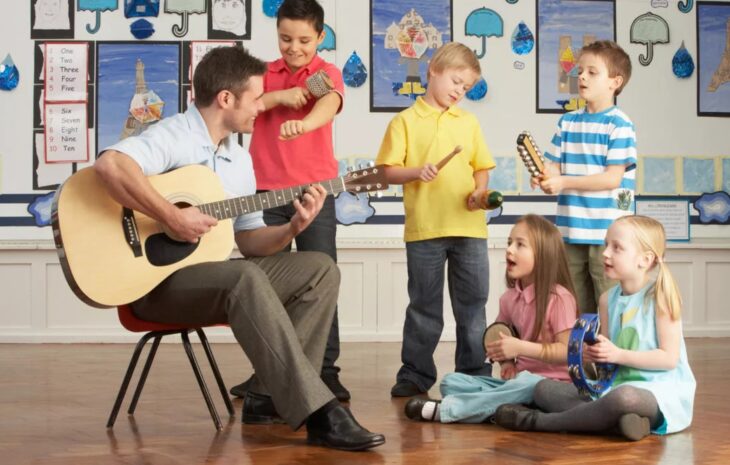
Source: Deseret News
Contents
- Improvement in Academics
- Reading ability, language, and Speech
- Focus, Discipline, and Patience
- Develops Physical Skills
- It brings Joy and relieves stress
- Introduction to other cultures
- Health and resilience
- Music inculcates social skills
- How learning music boosts self-esteem
- What to consider when enrolling your child for Music school/ Music Lessons
Improvement in Academics
You are probably wondering this one is an absurd exaggeration, which is why this is the first one on the list.
Whether you believe it or not, music is grounded in math. These two are highly intertwined, but it’s only apparent when you observe closely. As you subconsciously tap your feet in sync with the music, you are essentially counting beats. Or when you clap off-beats, you feel the syncopation resonating within you.
When a child begins to comprehend beat, rhythm, and scales, he/she automatically learns how to divide or decipher patterns.
According to a formal study conducted through the University of Toronto, researchers compared the IQ performance of children in music lessons with those in drama lessons or no extra lessons. The students taking music lessons showed greater increases in full-scale IQ scores than those in either group.
Recent studies also indicate that children who are musically trained or individuals who went to music school show better working memory abilities than those who are not. Working memory is the type of memory that allows us to recall things in circumstances when there is a lot of information to process at the same time. This is crucial for essential tasks such as mental arithmetic and reading comprehension.
Through music, children can explore a few scientific phenomena as well, such as harmonic and sympathetic vibrations, while plucking the strings on a guitar or violin. In this way, physics can be fun too!
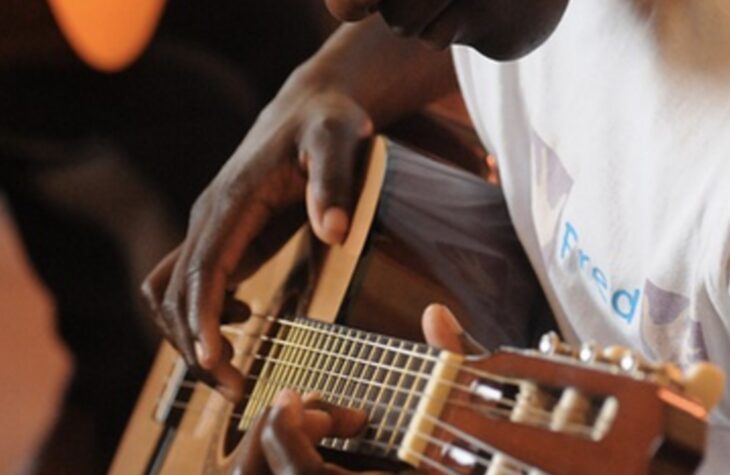
Source: Learnivore
Reading ability, language, and Speech
We often hear that music is a form of communication that transcends languages. However, experience shows that music can help children learn new spoken languages better.
Here is some boring but important information to make things more understandable. The phonological ability requires the identification of syllables and breaking up sounds. It is an essential requirement when it comes to reading, understanding, and speaking a language. Breaking up sounds is an essential skill that we gain through experience, which helps us understand our native language and new ones. Research shows that musically-trained children have better phonological skills, which aids them to learn words faster, develop a diverse vocabulary, and learn to read sooner. Speech and reading improvements are critical to school success, where strong literacy is a prerequisite for nearly every subject area, including mathematics.
But life is not all about grades. If you can read and speak better, you get better at social interactions, and your self-confidence gets a boost!
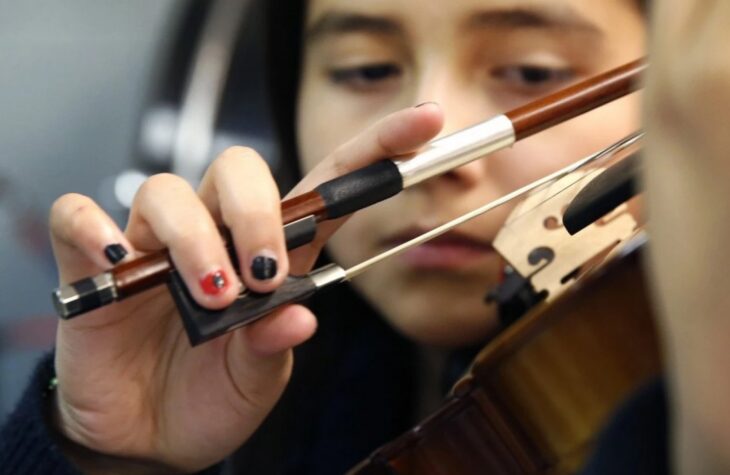
Source: Instruments of Change
Focus, Discipline, and Patience
Playing an instrument is not an easy task. It takes years to master a single instrument. A few musical instruments like the violin have a very steep learning curve. Before you can even play it, you need to learn how to correctly hold the violin, the bow, and the right way to position yourself. However, this teaches children the lesson of delayed gratification. That all good things come to those who wait.
Practicing every day for years forges good habits like consistency. And when the child sees that he is getting better, it further motivates him to do better than before, hence, challenging himself.
Learning to sing or play an instrument requires the utmost attention and concentration.
There is evidence that supports the claim that children who take music lessons have more extraordinary abilities to focus their attention. Music training is a very active form of mental training that enhances cognitive capacities, which enable children to perform better in many other aspects of their life.

Source: Sassy Mama Hong Kong
Develops Physical Skills
A fun fact for you: our body has muscle memory. It is because of muscle memory that you can still do it just the same when you ride a bike after years.
When you play specific musical instruments, such as the percussion or violin, they develop children’s ability to feel comfortable in positions that should be naturally inconvenient. Some instruments, like the piano, encourage ambidexterity.
Enhancement of hand-to-eye coordination, dexterity of the fingers, and perfecting timing can also help prepare children for sports or hobbies like dancing. It also gives your brain an excellent mental workout as it decodes the rhythm, speed, and harmony all at the same time to produce a melody.
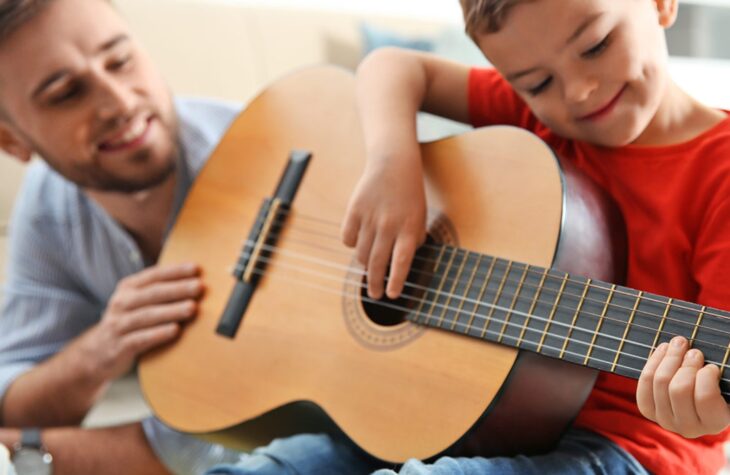
Source: Start Liverpool
It brings Joy and relieves stress
There are times when you feel like your head will explode. Your music can be your getaway. For a child going through performance anxiety as exams are nearing, he can let the steam off in a jamming session or play his favorite instrument.
Not only this but when a child starts to learn to play a new instrument, the sense of accomplishment he feels when he gets the beat right for the first time brings happiness like no other. This sense of achievement is essential to the child’s morale, which motivates him to continue.
In testimony from a prestigious music school student, “King George’s Music Academy,” the students said, “King George’s Music Academy is my music School. I chose this school because I wanted a physical teacher beside me to correct me if I go wrong somewhere. But the major reason was the experienced teacher, Mr. Chua Chun Leng. My happiest moment was when I was able to play a whole song after taking up drums with Mr. Chua Chun Leng.”
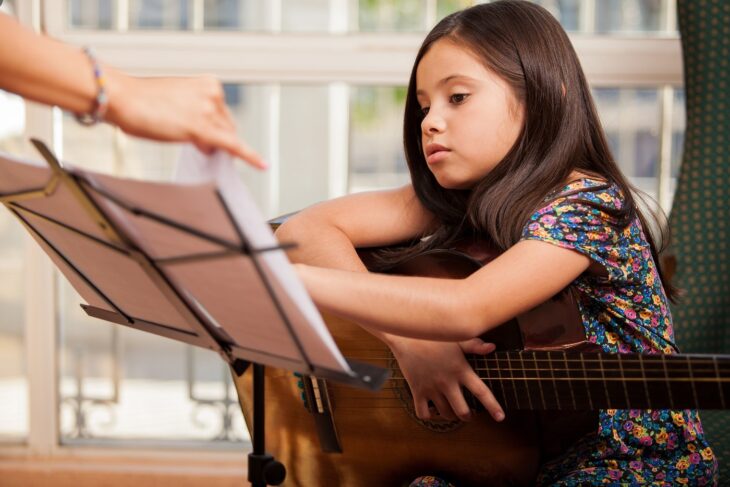
Source: Guitar Lessons in Wollongong
Introduction to other cultures
Music has a special place in every culture. The music of a region influences the dance, philosophy, and religion all influence and. By learning about the history and significance of an instrument that a child plays, he can discover how music plays a critical role in different cultures. For example, bongos and timbales may introduce children to African and Cuban styles of music. On the other hand, learning to play the violin exposes children to classical European music because the modern-day violin has roots in Italy. Classical music and jazz incorporate a variety of musical instruments that originated in South America. It is important to familiarize children with other cultures at a young age to foster open-mindedness and tolerance about traditions beyond the ones they know.
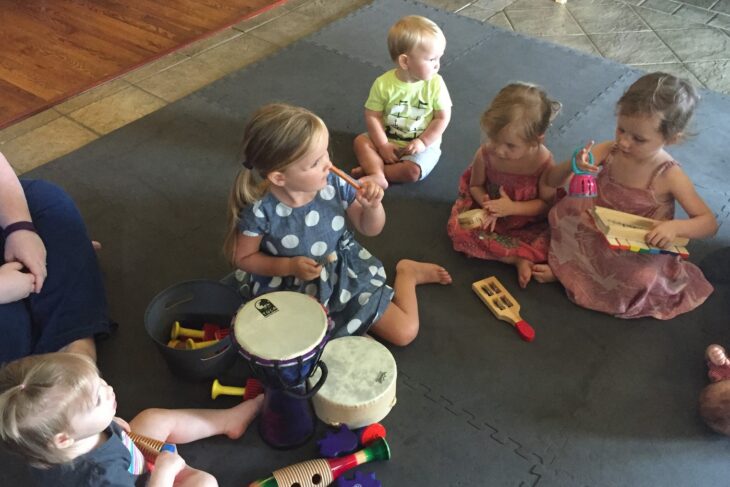
Source: pianissimo | a very piano blog
Health and resilience
This one will hearten your hearts, parents! Studying music can bring children life-long health benefits. As we age, music training can offer improved cranial function. Music therapy has helped people recover from strokes and can help treat various neurological disorders, such as stuttering, autism, and Parkinson’s disease, and can also delay the onset of dementia.
And did you know that music study can compensate for hearing loss in adults! Research shows that seniors with musical training can pick out sounds in noisy environments and can carry on conversations better than those without this training, even though they’ve suffered hearing loss.

Source: Platform & Stream
Have you ever wondered why music emerged and prevailed when humans began evolving? Well, it is because it tends to draw knots between people. I am sure all of us can come up with at least one song that reminds us of each other. That is the power music holds!
When you share your air pods with a friend and listen to music together, the music alone can
synchronize movements and brain activity between you two. Feelings of shared empathy are evoked, and differences are bridged. You immediately experience a boost of connectedness!
Why do you think movies play a song whenever a romantic or heartbreaking scene plays? It is to narrow the gap between the actor and viewer and evoke the same feelings in you.
Don’t take my word for it. Check out this study.
Research showed that in a musical play of 4-year-olds, kids impulsively showed greater cooperation toward their fellows than the same play void of any music.
If you have a toddler hopping around in your house, you may have experienced music’s charisma firsthand. Kids tend to connect better with parents whenever a rhyme or poem is being played.
If your child is learning how to play an instrument, he can make friends at music school and experience new things like playing at a school play or simply for friends.
The same is the case with any concert or a party; the music is what blends people and brings forth compassion and cohesion. A party wouldn’t last an hour without boring you out of your wits if it wasn’t for the aura music creates! Especially if you know how to play an instrument, you will be the heart of the party!
Thus, music heightens social interaction.
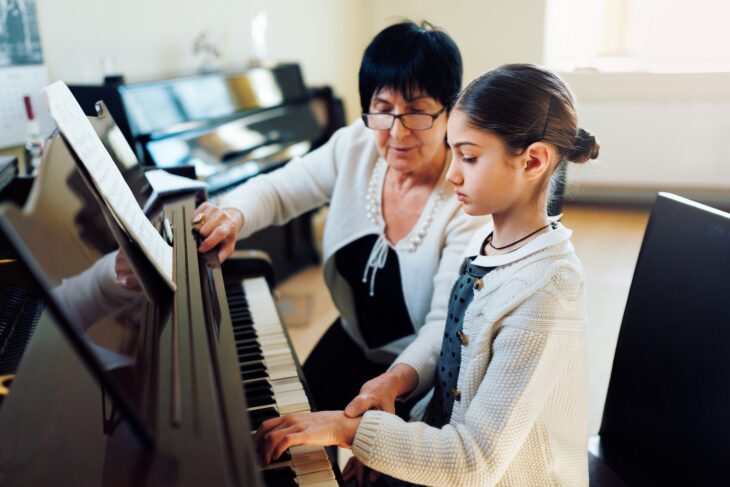
Source: NearSay
How learning music boosts self-esteem
Is it true that music helps boost your self-esteem? You might be surprised to know-how. Music brings out our creative side, and when we are creative, we tend to give our best. This can heighten self-confidence. Motivating songs can give you just the right push to get the job done.
Your child will make bold decisions and challenge himself when he achieves a milestone like playing a whole song on his piano for the first time. This, in turn, will skyrocket his self-esteem.
What to consider when enrolling your child for Music school/ Music Lessons
It may seem like the best decision to enroll your child for lessons after reading this article, (hopefully), but think the decision through. Talk to your child first and see if he/she is interested. When choosing a school, look for experienced teachers that can transfer their knowledge. This is important because teachers make sure their students are comfortable and learn to his full capacity. They give their input but also value the opinion and comfort of their students. If something so much fun like music becomes a burden on the child, it is futile to put in so much effort.
Choosing the right school is also critical. The environment, the faculty, the type of students that go there all matter.
Lastly, choosing the right instrument is vital. Make sure your child is interested, and his/her temperament matches the instrument. Affordability also comes into play because many musical instruments are expensive, and their maintenance costs are high.
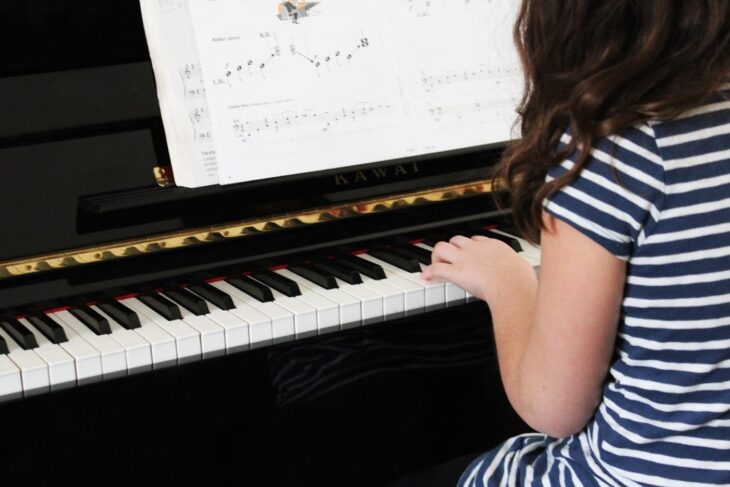
Source: Quack Track
Learning music is a great hobby that is not only fun but will also enhance the natural talents of your child. To acquire a skill of such finesse at such a young age is an achievement every child should be encouraged to go for!
